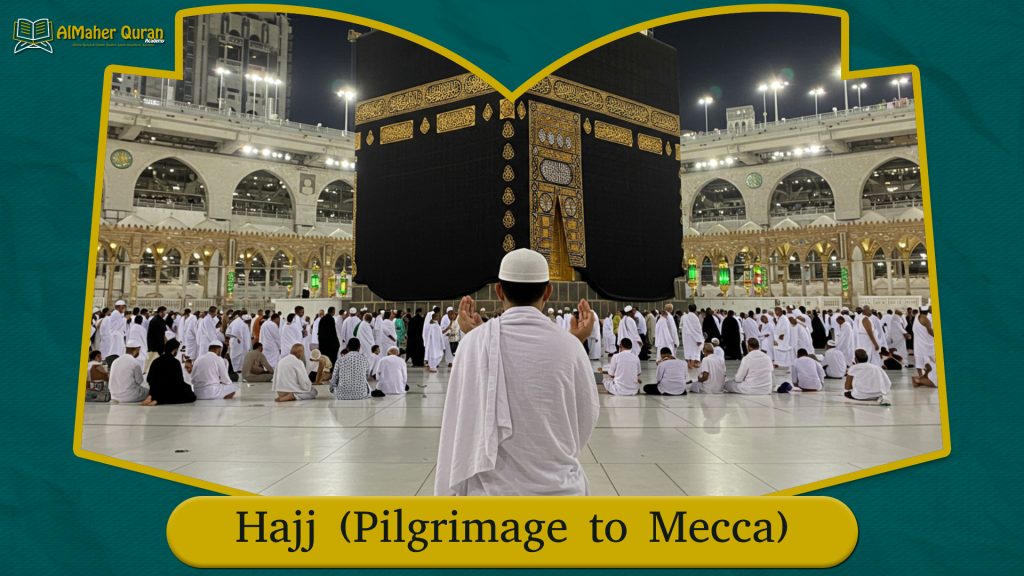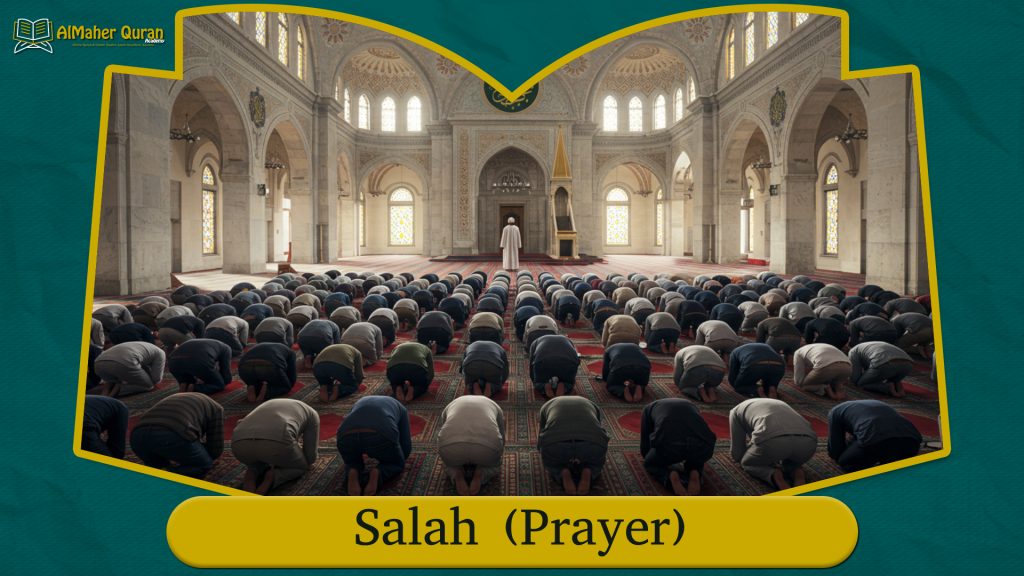The 5 Pillars of Islam: Basics of Muslim Faith
The 5 Pillars of Islam are Shahada, Salah, Zakat, Sawm, and Hajj, represent the core religious practices that define a Muslim’s faith.
Islām is a complete way of life that guides all Muslims through all aspects of daily living.
The five Pillars of Islam, the essential religious duties that every believer is expected to uphold.
The five pillars of Islam define the basic identity of Muslims
The 5 pillars of Islam form the foundation for a Muslim’s faith, worship life.
Understanding these core practices is key for anyone who wishes to learn, understand, or live by Islam.
Whether you’re new to the Islamic faith or simply exploring its spiritual framework.
This article offers a clear guide to the basics of the Muslim faith.
Start your journey to exploring each of the five pillars of Islam with AlMaher Quran Academy courses.

What Are the 5 Pillars of Islam?
The 5 Pillars of Islam are the five obligations that every Muslim must fulfill in their daily life.
The 5 Pillars of Islam are called the Five Pillars of Islam.
These acts of worship and devotion are more than rituals.
Said the Messenger of Allah (PBUH):
Islam has been built on five pillars:
testifying that there is no god but Allah and that Muhammad is the Messenger of Allah, performing the prayers, paying the Zakah, fasting in Ramadan, and making the pilgrimage to the House. [Bukhari & Muslim].
The five pillars of Islam include:
Shahada (Declaration of Faith)
What is Shahada in Islam?
The Shahada, or testimony of faith, is the first pillar of Islam and the gateway into Islam.
It is a verbal profession that declares:
“La ilaha illa Allah, Muhammadun rasul Allah,”
which means, “There is no god but Allah, and Muhammad is the Messenger of Allah.”
Shahada is the Islamic declaration of faith, affirming the belief in the oneness of Allah and the prophethood of Muhammad.
It states, “There is no god but Allah, and Muhammad is His prophet.”
Shahada marks the entry into Islam and reflects a Muslim’s core belief and identity.
This declaration confirms a person’s belief in the oneness of God and that the Prophet Muhammad is His final Prophet.
The shahadah is not just a spoken phrase but a deep creed that shapes the entire life of a Muslim.
Learn the deeper meaning and spiritual power of the Shahada with expert teachers at AlMaher Quran Academy
Salah (Prayer)
What is Salah (Salat)?
Salah in Islam (also spelled Salat or simply prayer), is the ritual prayer performed five times a day:
Prayer (Salah) is the pillar of religion. Whoever performs it has established religion.
Prayer Fajr (dawn), Prayer Dhuhr (midday), Prayer Asr (afternoon), Salah Maghrib (sunset), and Salah Isha (night)
Salah, also known as Salat, the one of the Five Pillars of Islam.
Salat is the Islamic practice of performing ritual prayers five times a day.
Prayer strengthens faith, brings discipline, and reminds Muslims of their purpose.
It is a practice of Islam and a connection between the humans with Allah, performed at specific times daily.
These prayers are an obligatory form of worship and devotion to God.
They help Muslims maintain a strong connection with God, no matter where they are or what they’re doing.
Establishing salah is an obligatory duty and a sign of submission, love, and faith.
Let us help you master your prayer and establish Salah in your life with discipline.
Zakat (Charity or Almsgiving)
What is Zakat in Islam?
Zakat in Islam is a form of almsgiving that serves as a means of supporting the less fortunate.
Muslims who meet a certain financial threshold are required to give away 2.5% of their wealth each year.
More than just charity, zakah purifies one’s wealth and promotes social equality.
It provides a spiritual reminder that all provisions come from Allah and are meant to be shared.
Through Zakat, the Muslim community shows compassion, unity, and support for one another.
Zakat in Islam (Charity or Alms) is a form of charity, requiring Muslims to give a portion of their wealth, typically 2.5%, to those in need.
Zakah purifies wealth and reduces inequality.
Zakat is one of the Five Pillars of Islam, reflecting a Muslim’s duty to care for others and promote social justice.
Discover how to fulfill your Zakat properly through guided Islamic learning with us
Sawm (Fasting during Ramadan)
Fasting (Sawm) is one of the five pillars of Islam and fasting during the month of Ramadan.
Muslims abstain from food, drink, and sinful behavior from dawn to sunset.
Sawm (fasting) promotes self-discipline, gratitude, and spiritual growth.
Sawm strengthens faith and empathy, reminding Muslims of their dependence on Allah and the needs of others.
Fasting (Sawm) refers to fasting during the holy month.
Muslims abstain from food, drink, and other physical needs from dawn until sunset as an act of worship, self-discipline, and spiritual reflection.
Fasting helps believers develop empathy for the poor, gratitude for their blessings, and a stronger connection with Allah.
Taraweeh prayers are also performed during the nights of Ramadan to pray for forgiveness and draw closer to Allah so that our fasting may be accepted.
It also encourages a heightened awareness of Islamic teachings.

Hajj (Pilgrimage to Mecca)
What is Hajj in Islam?
Hajj, (pilgrimage) is the sacred pilgrimage to the city of Mecca in Saudi Arabia.
Every Muslim who is physically and financially able must perform pilgrimage (Hajj) at least once in their lifetime.
This ritual is performed annually during the Islamic month of Dhul Hijjah and involves a series of symbolic rites that commemorate the actions of Prophet Ibrahim (Abraham), his wife Hajar, and their son Ismail.
Hajj is a powerful reminder of unity, obedience, and the global nature of the Muslim Ummah.
Prepare for the spiritual journey of Hajj (pilgrimage) by learning its rituals and history through the trusted guidance of AlMaher Quran Academy.
Facts About the Five Pillars of Islam
– Not Optional: All five pillars of Islam are obligatory for every adult Muslim, male or female, who is of sound mind and body.
– Different Forms of Worship: Each pillar represents a different form of worship, verbal (shahada), physical (salah), financial (zakat), spiritual (sawm), and combined (hajj).
– Timeless Relevance: Though some pillars like Hajj happen annually, others like Salah occur multiple times a day, highlighting the continuous nature of faith.
– Found in Hadith: The Prophet Muhammad explicitly described the 5 Pillars of Islam in many hadiths, reinforcing their central role in the faith.
– Promotes Peace and Balance: These acts of worship help establish fairness and balance in both personal lives.
– Encourages Brotherhood: Rituals like pilgrimage bring millions together, emphasizing unity, humility, and the shared beliefs of Islam.
– Link to the Hereafter: Many Muslims believe that fulfilling these obligations strengthens one’s chances of salvation and reward in the afterlife.
– Support System: The 5 Pillars of Islam provide a support structure for a Muslim’s moral and social struggles (jihad) in life.
– Guidance for All Ages: From the young learner at AlMaher Quran Academy to the elderly, the pillars guide Muslims throughout all ages.
– Foundation of True faith: These practices are of what is considered true faith in Islam; without them, one’s identity is incomplete.
At Al Maher Academy, learn the basic pillars by enrolling in an online Quran recitation course to learn the facts of the five pillars.
Conclusion:
A Sacred Guide to Muslim Life
The five Pillars of Islam, the declaration of faith (shahada), prayer (salah), almsgiving (zakat), fasting (sawm), and pilgrimage (hajj).
The 5 Pillars of Islam are the basis of a Muslim’s faith and serve as a righteous living.
These practices are not only acts of religious significance but are also tools that shape the character, values, and priorities of every believer.
From a day rhythm of salah to the once-in-a-lifetime journey of Hajj, both represent a unique way of expressing to Allah.
Institutions like the AlMaher Quran Academy play a vital role in helping Muslims, both young and old, to learn, practice, and understand these pillars through interactive and spiritually enriching courses.
For those seeking to build a deeper relationship with their faith.
Grasp the true foundations of Islam, or simply explore the beauty of regular prayer, the 5 Pillars of Islam are the perfect starting point
Incorporating these pillars into their daily lives can ensure that their faith, actions, and intentions are always aligned with the sacred path laid out by the Prophet Muhammad.
Join AlMaher Quran Academy and let your faith flourish with proper knowledge and guidance.

